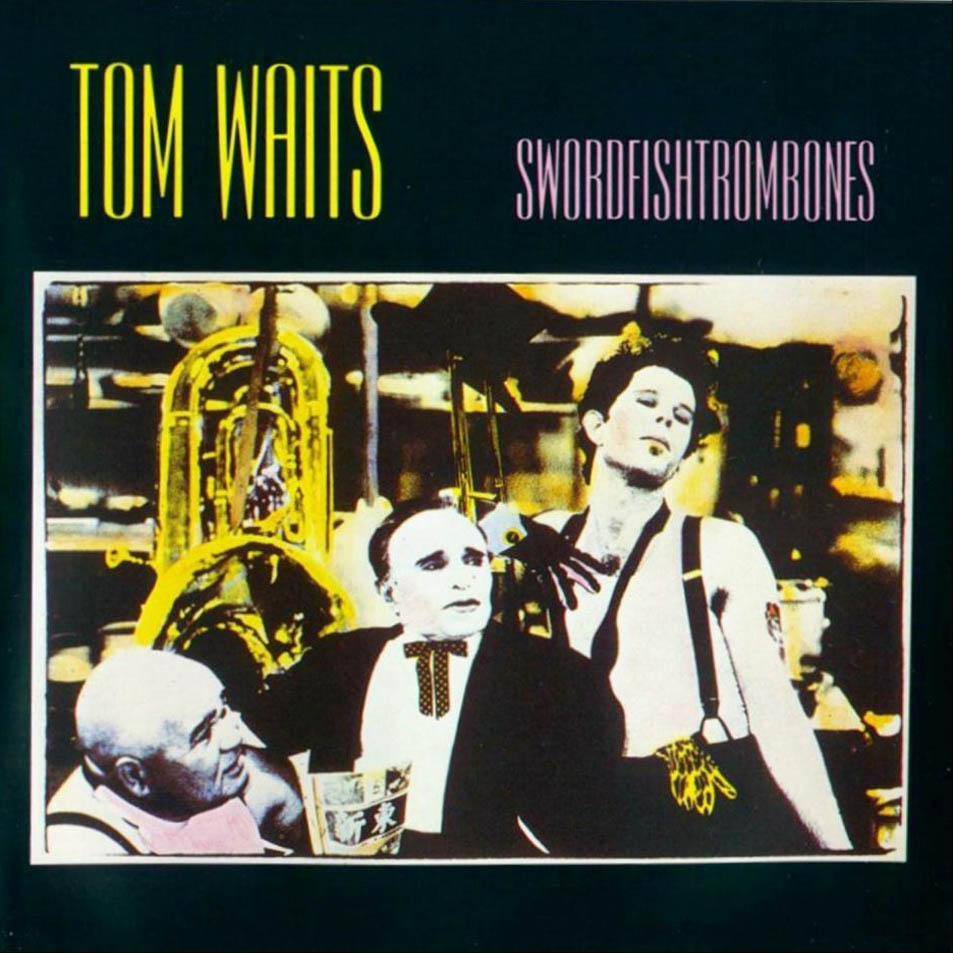Rewind Record Review: ‘Swordfishtrombones’ by Tom Waits

Editor’s note: Truly great music has the power to affect listeners decades later, as demonstrated by SMI’s newest contributor, Harrison Mains. Although Harrison is young, he’s a powerhouse of talent – an accomplished musician, comic, and writer. Please join us in welcoming him as he puts all of those talents to use, showing the download generation that vinyl never goes out of style. – Jennifer Austin
By the 1970’s, the jazzy nightclub singer was a dying breed. One of the most talented of the remaining stars was Tom Waits, who was heavily influenced by artists such as Frank Sinatra and Thelonious Monk. Then one day in the early 80’s, his wife Kathleen played him the album Trout Mask Replica by Captain Beefheart… and Waits’ career changed forever.
In 1983, Tom Waits released an album that was considered not only a wild departure for him as an artist, but the beginning of the Tom Waits as we know him. The album Swordfishtrombones took Waits from being the club singer who never gave in to what was topping the charts, to the genius who defies description in every way.
The album opens with a shifty little stomper called Underground, where Waits barks with his sandpaper rasp, telling the story of “a world going on underground.” Trading his club singer persona for that of a wine-guzzling, knowledgeable gypsy, the off-key guitar sounds that would later make the track Clap Hands on his 1985 magnum opus Rain Dogs so memorable are introduced to Waits’ cult following, and embraced as part of a wild and interesting new direction for his music. Waits masterfully describes the creepy imagery that goes along with such a concept, such as, “All the roots hang down/Swing from town to town,” and “Below the mine shaft roads/It will all unfold.” We get a glimpse of how keen he is at developing original and thought-provoking ideas, later demonstrated by Mule Variations‘ song, The House Where Nobody Lives, Bone Machine‘s song, Earth Died Screaming, and Blood Money‘s song, God’s Away On Business. This talent would later inspire the likes of Les Claypool to write similarly, such as with the Primus song Too Many Puppies, a play on the idea of the “dogs of war,” asserting that many soldiers are too young to go to battle. With the addition of a lone horn and a creepy bass marimba (that I’ve never heard in any other artist’s music like this), Underground is one of Waits’ strongest opening numbers.
The next track is mostly a spoken-word story called Shore Leave. The marimba once again punctuates the haunting shipyard sounds floating over the march of the drums, as the musical instruments are mostly for atmosphere. Waits tells the story of lurking through Chinatown, missing his wife, and doing whatever he can to entertain himself in the seedy underbelly of the town at night. Waits engages in various activities, describing how he “shot billiards with a midget until the rain stopped,” and “talked baseball with a lieutenant over a Singapore sling.” The instruments create a feel around Waits’ smooth, grim voice, such that it spawns little doubt about this being an absolutely true story. The haunted house fog that sets over the song is cleared briefly by the chorus, before you start to feel uncomfortably all alone. Finally, the air is sliced in two by the absolute creepiest falsetto I have ever heard in my life, musically chanting, “Shore leave…shore leave…shore leave…” It’s a classic example of Waits’ mastery of feel, tone, and story-driven hobo poetry.
One of my favorite things about Tom Waits is his instrumentals, because they always fill a space where the album couldn’t progress without it. They’re almost like little palette-cleansers between tone-shifts. Dave the Butcher is one such instrumental, relying heavily on Waits’ use of the Hammond organ, the first time on the album. Though we know nothing about the story behind it, the title does give a rather menacing idea of what horrible place this song is the soundtrack to.
The next song is a short, very beautiful number called Johnsburg, Illinois. It’s a little piano piece, and a love song where Waits talks about pictures of his wife in his wallet, and the tattoo of her name on his arm (next to his own). As he rasps solemnly over his music, you can hear the strain of trying to describe his loved one to another, a sometimes impossible task to those who can’t understand. Waits tends to flesh out a few full songs per record, but Rain Dogs was no longer than any other album with just one LP, in spite of containing 28 different songs. He often includes very short mini-songs that, all things considered, are always exactly as long as they need to be.
The next song is considered to be one of the greatest accomplishments of Waits’ career. The epic story arc, stomping beat, badass riff, and signature sneering growl of Tom Waits’ incredibly unique and emotional voice makes Sixteen Shells from a Thirty Ought-Six a true musical powerhouse. From what I can gather, the story of the song is that a guy tries to shoot a crow that’s been tormenting him, but it gets away from him. Now, Waits could have just said this, but being the all-powerful, mystical junkyard poet he is, he instead said, “I plugged sixteen shells from a thirty-ought-six/And a black crow snuck through a hole in the sky.” The line after is confusing, yet vivid, saying, “So I spent all my buttons on an old kick mule/ Wo-oah, and I made me a ladder from a pawn shop marimba,” which is my favorite part of the song. The satisfying pluck of the guitar strings fits well over Waits’ signature clanking sound that sometimes almost crosses him over into industrial-sounding. The story continues as he takes his ladder and, “Leaned it up against the dandelion tree.” After vowing (this isn’t written down in the lyrics, but I think he’s saying) “I’m gonna cook that feller on a tire iron spit,” he does more things that defy explanation, saying, “And I filled me a satchel full of old pig corn/And I beat me a billy from an old French horn/And I kicked that mule to the top of the tree.” As the horn drones on, menacingly, Waits barks that he, “Blew me a hole ’bout the size of a kick drum,” perhaps saying he shot this hole in the tree, going on to say, “And I cut me a switch from a long branch elbow,” (a switch being a stick used for beating, as anyone with a Southern grandmother knows). His distaste for the crow carries into the chorus, where he shouts to the point of gravelly voice cracks, “I’m gonna whittle you into kindlin’/Black Crow sixteen shells from a thirty-ought-six.” The song plucks on as he says, “Well I slept in the holler of a dry creek bed,” (more old Southern terminology). He also growls, “And I tore out the buckets from a red Corvette,” the bucket being the part that holds the headlight of a car on, so maybe he was using it as some kind of flashlight. He then says, “Lionel and Dave and the Butcher make three/Wo-oah, you got to me by the knuckles of the skinnybone tree.” The next line makes little sense until the next verse, saying, “With the strings of a Washburn stretched like a clothesline/Wo-oah, you know me and that mule scrambled right through the hole.” The next verse presents a resolution to the story, going, “Now I hold him prisoner in a Washburn jail/That I strapped on the back of my old kick mule, strapped it on the back of my old kick mule/Bang on the strings just to drive him crazy/Woah, and I strum it loud just to rattle his cage.” So, he shoved the crow inside a Washburn guitar, rode off on the mule, and started playing the guitar to torture the crow like it tortured him. (Thank goodness Waits rarely deals in metaphor, otherwise I may become confused as to the point of his songs.)
The next piece is called Town With No Cheer, followed by a similar song (lyrically, but certainly not musically) called In the Neighborhood. While Cheer is a somber piano number, Neighborhood is more of a march. They both tell the stories of little populated areas, and while one is obviously depressing, the other seems to keep its sad themes a secret, hiding behind the veil of the uplifting music. Cheer describes the town like it’s telling you what a horrible place this is to be, saying, “Well it’s hotter ‘n blazes, and all the long faces/There’ll be no oasis for a dry local grazier,” and, “There’s nothing sadder than a town with no cheer.” It talks about a drought, which may or may not be a metaphor for spirit, motivation, or something else along those lines (or it could be all of them). There seems to be no hope in the descriptions, continuing the poetic beauty with, “Now it’s boilin’ in a miserable March 21st/Wrapped the hills in a blanket of Patterson’s curse.” Neighborhood describes a bunch of tiny little gripes, as presumably told by someone who lives…in the neighborhood. The thing is, there’s a very uplifting, almost universally nostalgic childhood feel to it, so it just makes you think he doesn’t care very much about his gripes, since they’re just part of life. However, something really sneaks up on you during this song. There’s little gripes in the first verse, like, “The dogs tipped the garbage pails over last night/And there’s always construction work bothering you.” Okay, not too bad. I’m engaged, but this isn’t disastrous. In the second verse, it steps up a little bit, saying, “Well Friday’s a funeral, and Saturday’s a bride/Sey’s got a pistol on the register side.” Okay, so somebody died, and somebody got married, and a store owner keeps a gun around in case somebody tries to steal something. That’s a little more extreme. But it goes on, saying, “And the goddamn delivery trucks, they make too much noise/And we don’t get our butter delivered no more.” Okay, back to grumpy old man stuff. The third verse, however, takes this idea to a pretty shocking extreme. Waits says, and this is the actual third verse, “Well Big Mambo’s kicking his old gray hound/And the kids can’t get ice cream, ’cause the market burned down/And the newspaper sleeping bags blow down the lane/And that goddamn flatbed’s got me pinned in again.” Wait…what? So let me get this straight, there’s a guy that’s beating his dog, the market burned to the ground, there’s a bunch of homeless people that sleep under newspapers, and the narrator is stuck living in a trailer. Well that was certainly a jump in the field of depression. I mean, Jesus, did the kitten hospital explode or something? And the last verse returns to normal without even mentioning the horrors of the third! It just about what people are doing, and more complaining about construction! What gives? Regardless, it’s an extremely good song, as is Cheer, and they deserve to be analyzed together, as these similar themes wrap up the first side.
Side two opens with an instrumental, which kind of sounds like something you’d hear in a Pixar movie. Listening to Just Another Sucker on the Vine makes me either think of a panning shot in Monsters Inc. or something, or else that one really mellow scene in Who Framed Roger Rabbit? where the detective, Eddie Valiant, is in his office putting things away and drinking. The trumpet just kind of seems like either a 40’s mystery atmosphere sound, or something that should be accompanying Randy Newman, as does Waits on the harmonium.
Another great thing about Tom Waits is his spoken word pieces. While Shore Leave did have some creepy singing, Frank’s Wild Years is just a little story over a finger-snappin’ organ and a bouncy acoustic bass. It describes a man and his “spent piece of used jet-trash” wife, who live in a house together and lead a happy life. I don’t want to spoil it for anyone, but the ending is extremely dark and truly hilarious. Waits does a very good job with his poetic descriptions in this one.
Next is the title track, Swordfishtrombone. The pluralization was added to the title of the album for…a reason, I’m sure. The beat grooves with its use of conga, bass, and dabuki drums, along with the creepy marimba. It also features both an acoustic and an electric bass. The story is…confusing. From what I can tell, a guy comes home from war a little off his rocker, and…the rest is just too much. There is a part where he goes to Hollywood to…play the banjo or something, and he ends up…doing more insane things. I have literally no idea what’s going on. It’s interesting and poetic, but I can’t follow it at all. It sounds all seedy, but in the end, it’s really just chaos. Not Beefheart chaos, but a lyrical puzzle that may never be solved. I expected a song called Swordfishtrombone to make sense! I mean…well, maybe that’s not a great case.
The next track is called Down, Down, Down. It’s a fast-paced, blues-sounding stomp that’s about what we can assume is a very bad man, getting involved with the Devil, cheating, lying, and going in a downward spiral, descending further into madness. The organ dances around the other instruments (lending itself to an awesome solo), while Waits’ gravelly snarl makes your throat hurt just listening to it. You could really see this being performed in an old blues club with everyone either clapping and stomping along, or laughing and staring in awe at Waits’ unmistakable stage presence, as the music possesses him and he becomes one with it.
One of Waits’ best and most depressing songs comes after the fun, strange, and up-tempo songs that have so far made up the second side. The gloom of Soldier’s Things makes it unclear as to what is going on, but the most likely explanation is that someone is going through the belongings of a dead soldier, and is packing them up to send to his family. As you see more into the soldier’s life, you start to get a feel of who he was while Waits lists off his belongings, along with some damaged items, adding, “All this radio really needs is a fuse,” and “This jackknife is rusted, you can pound that dent out on the hood,” after describing his car. It gets more depressing as you learn just little things, like there were rocks in his boots, he played the clarinet, he had a few books, some medals to his name, and the most somber note, “Everything’s a dollar in this box.” It’s an unforgettable track from an inimitable artist.
The next song is just drums, bass, guitar, and the sleazy vocals of Tom Waits playing the album’s only real straight-up blues song. Gin Soaked Boy is about a man who suspects his wife is having an affair “with some gin-soaked boy that you don’t know.” The bass just thumps along nicely, while the drums keep a fairly simple beat that gets a little more complex as the song goes along, smacking at the tambourine the whole time. The slide guitar plays little riffs throughout the song, probably improvised, and the song ends on a guitar solo that’s, admittedly, nothing special, but it serves the song well. The man in this song accuses his wife harshly, saying things like, “You been lying to me, how could you crawl so low?” and, “You said you goin’ to your ma’s, well where the hell did you go?” My favorite line is at the end, where Waits demonstrates his knowledge of old phrases, as well as his sophisticated vocabulary, saying, “Well I’m on your tail, and I sussed your M.O.” It’s the kind of song you wouldn’t mind drinking to on a Saturday night, tapping your feet all night long, and wondering what your wife is up to…
The next song sounds extremely menacing, using nothing but acoustic bass, African talking drum, and Parade bass drum. There’s no real singing, but Trouble’s Braids sounds very urgent, like a chase through a jungle in the dark. Waits confesses over and over again to “Pulling on trouble’s braids,” which does warrant chase-sounding music, as Waits sounds like he’s running from something. He frequently talks about hiding in places, like briars, old cars, and a dead tree. He never explains what he’s done to make his running a necessity, but he makes the town he’s in sound like a dystopian wasteland, an almost cliffhanger ending to the lyrical journey that has been this album.
The final track on the album is an instrumental called Rainbirds. With three different people on the creepy glass harmonica, it once again sounds like the ending to some old detective drama. Perhaps it was put at the end of the album to demonstrate the somber tone that would ultimately end up being the core of Tom Waits as an artist, a darkness that has to be brought to light at some point, or a sensitivity behind the booze and the gunshots in a time when Waits was, as he put it to good friend David Letterman, “Pretty much smoking and drinking around the clock.” Think of it as a pseudo-lullaby to put your mind to rest, and know, finally, it’s all over.
This album was, at the time, Waits’ best and most musically eclectic work, as well as a major departure for him. He was strange, exotic, and menacing, while also appearing well-read, intelligent, and poetic, like a good movie villain. Waits would only get better from here, and went on to make even more of the greatest albums of all time. A voice like Waits’ can’t help but be taken seriously in everything that he decides to do (even if he does sound like Cookie Monster from time to time). Tom Waits is definitely an artist that you either love or hate, like the artists who inspired him, and the artists he inspired, but the people who love him will cherish his work for their whole lives, and this album will definitely be close to the top of the pile.





0 comments